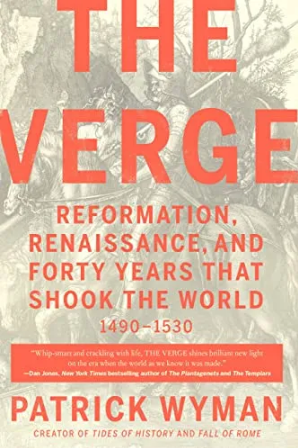World War Two
Published 23 Nov 2023What if I told you that a new conflict will sweep the globe in less than a year? It will open not with gunshots but with silent, shadowy espionage. The man who will kick off the Cold War is a quiet Canadian pilot, millionaire, and spymaster. A trusted aide to Churchill and FDR. I bet you haven’t heard this name before: William Stephenson.
(more…)
November 24, 2023
The Man Who Started the Cold War
More than 1,500 new jobs thanks to federal and provincial subsidies … except the jobs are for South Koreans
Tristin Hopper applauds the great job creation scheme that the federal and Ontario governments have put in place … if you ignore the inconvenient fact that most of the newly created jobs aren’t even going to Canadians:
When the Ontario and federal governments greenlit one of the biggest corporate subsidy payouts in Canadian history last summer, their main pitch was the deal would create jobs.
“The governments of Canada and Ontario are partnering to attract once-in-a-generation projects that will anchor our auto manufacturing sector and keep good jobs in Canada,” reads the opening line of a July 6 joint statement announcing a record-breaking $28 billion in government “performance incentives” to secure two foreign-owned EV battery factories in Southern Ontario.
The subsidy-per-job ratio was never great. Even according to the most optimistic estimates of government spokespeople, the two factories — one operated by Volkswagen, the other by Stellantis — would create about 5,500 jobs. Per job, that’s roughly $5 million in lifetime subsidies and tax credits.
But now, it appears that many of those jobs may not even go to Canadians.
Last week, during a visit by South Korean Ambassador Woongsoon Lim to Windsor, Ont., a social media post by the Windsor Police casually mentioned that “1,600 South Koreans” would soon be arriving in the community to staff the Stellantis plant, which is set to open next year.
With the new LGEngergy Solutions battery plant being built, we expect approximately 1,600 South Koreans traveling to work and live in our community in 2024.
— Windsor Police (@WindsorPolice) November 16, 2023
The CEO of NextStar — the Stellantis joint venture operating the factory — hasn’t confirmed the 1,600 figure, but said in a statement that the “equipment installation phase of the project requires additional temporary specialized global supplier staff”. He added that the company was “committed” to hiring Canadians to fill the 2,500 full-time jobs at the completed plant
The revelation has sparked a wave of confusion and finger-pointing among the very officials who, mere months ago, were championing the plant as an unalloyed triumph for Canadian manufacturing jobs.
When the subsidy arrangement was first announced in July, Ontario Economic Development Minister Vic Fedeli called it a “historic deal” and “a great agreement” that “protects the thousands of jobs quite frankly that were at stake”.
Freshwater Flattops; The Corn Belt Carriers Wolverine and Sable
[NR: These fascinating lake vessels first came to my attention back in 2013 – Lake Michigan’s carrier fleet.]
Ed Nash’s Military Matters
Published 8 Aug 2023Sources for this video can be found at the relevant article on:
https://militarymatters.online/
(more…)
QotD: “Citizenship” in the ancient and classical world
… before we dive into how Roman citizenship worked, we need to have a baseline for how citizenship worked in most ancient polities so we can get a sense of the way Roman citizenship is typical and the ways that it is different. In the broader ancient Mediterranean world, citizenship was generally a feature of self-governing urban polities (“city-states”). Though I am going to use Athens as my “type model” here, citizenship was not exclusively Greek; Italic communities; Carthage seems to have had a very similar system. That said, our detailed knowledge of the laws of many of the smaller Greek poleis is very limited; we only know that the Athenian system was regarded more-or-less as “typical” (as opposed to Sparta, consistently regarded as unusual or strange, though even more closed to new entrants than Athens).
Citizenship status was clearly extremely important to the ancients whose communities had it. Greek and Roman writers, for instance, do not generally write that “Athens” or “Carthage” do something (go to war, make peace, etc), but rather that “the Athenians” or “the Carthaginians” do so – the body of citizens acts, not the state. Only citizens (or more correctly, adult citizen-males) were permitted to engage in direct political activity – voting, speaking in the assembly, or holding office – in a Greek polis; at Athens, for a non-citizen to do any of these things (or to pretend to be a citizen) carried the death penalty. This status was a jealously guarded one. It had other legal privileges; as early as Draco’s homicide law (laid down in 622/1) it is clear that there were legal advantages to Athenian citizenship. After Solon (Archon in 594), Athenian citizens became legally immune to being reduced to slavery; non-citizen foreigners who fell into debt were apparently not so protected (for more on this, see S. Lape, Race and Citizen Identity in the Classical Athenian Democracy (2010), 9ff). Citizenship, for those who had it, was likely the most important communal identity they had – certainly more so than linguistic or ethnic connections (an Athenian was an Athenian first, a Greek a distant second).
So then who got to be a citizen? At Athens, the rules changed a little over time. Solon’s reforms may mark the point at which citizenship became the controlling identity (Lape, op. cit. makes this argument). While Solon himself briefly opened up Athenian citizenship to migrants with useful skills, that door was soon slammed shut (Plut. Sol. 24.2); citizenship was largely limited to children with both a citizen father and a citizen mother (this seems to have been more flexible early on but was codified into law in 451/0 by Pericles). Bastards (the Greek term is nothoi) were barred from the citizenship at least from the reforms of Cleisthenes in 509/8. This exclusivity was not unique to Athens; recall that Spartiate status worked the same way (albeit covering an even smaller class of people). Likewise, our Latin sources on Carthage – no Carthaginian account of their government (or indeed any Carthaginian literature) survives – suggest that only Carthaginians whose descent could be traced to the founding settlers had full legal rights. Under the reforms of Cleisthenes (509/8), each Athenian, upon coming of age, had their claim to citizenship assessed by the members of their respective deme (a legally defined neighborhood) to determine if they were of Athenian citizen stock on both sides.
It is worth discussing the implication of those rules. The rules of Athenian citizenship imagine the citizen body as a collection of families, recreating itself, generation to generation, with perhaps occasional expulsions, but with minimal new entrants. Citizens only married other citizens because that was the only condition under which they could have valid citizen children. Such a policy creates a legally defined ethnic group that is – again, legally – incapable of incorporating or mixing with other groups. In this sense, Athenian citizenship, like most ancient citizenship, was radically exclusionary. Thousands of people lived permanently in Athens – resident foreigners called metics – with no hope of ever gaining Athenian citizenship, because there were no formal channels to ever do so.
(As an aside, it was possible for the Athenian citizenry to admit new members, but only by an act of the Ekklesia, the Athenian assembly. For a modern sense of what that means, imagine if it was only possible to become an American citizen by an act of Congress (good luck with the 60 votes to break a filibuster!) that names you, specifically as a new citizen. We don’t know exactly how many citizens were so admitted into the Athenian citizen body, but it was clearly very low – probably only a few hundred through the entire fourth century, for instance. In practice, this was a system where there were no formal mechanisms for naturalizing new citizens at all, that only occasionally made very specific exceptions for individuals or communities.)
In short, while there were occasional exceptions where the doorway to citizenship in a community might open briefly, in practice the citizen body in a Greek polis was a closed group of families which replaced themselves through the generations but did not admit new arrivals and instead prided themselves on the exclusive value of the status they held. The fact that the citizen body of these poleis couldn’t expand to admit new members or incorporate new communities but had become calcified and frozen would eventually doom the Greeks to lose their independence, since polities of such small size could not compete in the world of great kingdoms and empires that emerged with Philip II and Alexander.
Bret Devereaux, “Collections: The Queen’s Latin or Who Were the Romans, Part II: Citizens and Allies”, A Collection of Unmitigated Pedantry, 2021-06-25.
November 23, 2023
Quick Skills for Busy Woodworkers: Elevate Your Craft in 10 Minutes
Rex Krueger
Published 22 Nov 2023You can do real woodworking even if you’re short on time. Here are some ideas.
(more…)
Canada’s bold move in an increasingly unsettled world is to … cut the military budget
The rest of Canada’s friends and allies are almost all beefing up their military spending because the world situation has become objectively more dangerous, but Justin Trudeau has never been one to follow the trend, especially when it comes to icky military stuff. Tristin Hopper has the details:
Just as the Liberal government’s fiscal update confirms that they will be staying the course on high spending backed by high deficits, they’re making a notable exception when it comes to the perennially underfunded Canadian Armed Forces.
According to the latest budgetary projections, Canadian military spending is set to fall in absolute terms for at least the rest of Trudeau’s third term – the only G7 country to do so.
For the current fiscal year, Canada is set to spend $26.93 billion on its military. For the 2024/2025 fiscal year, that will drop to $25.73 billion, and then drop again to C$25.33 billion by 2026.
These cuts are all in spite of increasingly desperate calls by the minister of defence and the military’s own internal reports that the Canadian Armed Forces may soon struggle to fulfill even basic tasks. It also stands in sharp contrast to virtually all of Canada’s peer countries, who are roundly beefing up their defence spending in response to an increasingly volatile global environment.
While Bill Blair’s turn as Defence Minister has mostly involved shepherding nearly $1 billion in cuts, at the Halifax International Security Forum over the weekend he struck a very different tone of saying that Canada’s “aspirations” required “more resources”.
“We need to spend more on munitions. We need to spend more on military platforms, planes, submarines and ships. We need to spend more on the equipment, the resources and the training that the Canadian Armed Forces needs,” he said in comments published by the CBC.
And Blair’s assessment was comparatively rosy when compared to the Department of National Defence’s annual departmental results report.The 152-page document, which dropped earlier this month, painted a picture of a Canadian military that is hemorrhaging personnel and capability with no end in sight.
Among the highlights is a table indicating the “percentage of operations that are capable of being conducted concurrently”. Last year it was 100 per cent, but right now it’s plunged to a meagre 40 per cent.
“The CAF is currently unable to conduct multiple operations concurrently,” reads a footnote, adding that military readiness has been hit hard by “decreasing number of personnel and issues with equipment and vehicles”.
Recruiting is suffering an “applicant crisis”. There’s a shortage of “qualified aircraft technicians”. The military’s bases are in serious deterioration because they can’t afford “maintenance and repair”. Only about 40 per cent of the RCAF is operational due to “ongoing personnel shortages” and “inadequate maintenance infrastructure”.
It wasn’t too long ago that another defence minister, Anita Anand, was openly musing about raising Canada’s defence budget to the point where it would finally start meeting NATO’s minimum threshold for military spending.
A .22LR Berthier for the French National Police (CRS)
Forgotten Weapons
Published 15 Jun 2022In 1954, the Unique company (MAPF) in Hendaye France rebuilt a batch of 800 Berthier carbines into .22LR caliber for use by the Sûreté Nationale (later renamed the Police Nationale). These were to be used for training and also issued to prison guards. Both 1892 and 1916 pattern carbines were used, and so the CRS .22s can be found both with and without upper handguards. They were fitted with 5-round magazines from one of Unique’s pistol models. The change of the firing system from centerfire to rimfire was rather cleverly done, with the new barrels bored at a slight angle to obviate the need to change the firing pin geometry. This did require shaving down the cocking piece and changing the sights, however.
(more…)
QotD: The Austrian and Chicago schools of economics
[Bureaucracies will always expand far beyond the “problem” they were instituted to address] was, anyway, the view of that “Austrian school economist”, Ludwig von Mises, proponent like the rest in that school of “classical liberalism”. His hatred of bureaucracy was a wonderful, animated thing. In his great book, Human Action, and many others, he could become almost boring on the topic. What distinguishes the Austrian school from, say, the famous Chicago school of Milton Friedman and his ilk, was its European origin. (They were, however, consciously allied.) The “Austrians” go back, to Catholic antecedents, and their interests are not reducible to “pure economics” (scare quotes because there is no such thing). Over time it extended to broad social questions, and through a constant interest in the history of ideas. These were multilingual and multicultural, in the manner of the old Habsburg empire; where our American classical liberalism has been almost unilingually English, provincially distrustful of foreign thinkers, and buzzing with statistics. (You’ll need a degree in math.)
War propelled the “Austrian” thinkers westward, and the fall of the Berlin wall propelled the “Chicago” school east. The terms no longer have geographical significance.
What all classical liberals have in common is the passionate vindication and defence of human freedom. That is what makes them, unlike progressives, readable in subsequent generations. Their subject matter cannot become dated. The “Austrians” are also necessary to understand modern history, positively as well as negatively, in the evolution of, for instance, the Christian Democratic movement that conceived a peaceful post-war Europe, in defiance of secularizing bureaucratic trends and mass-man “ideals”. Alas, this was overall defeated by the Eurocratic trend-setters, determined to build a magnificent autocratic monument to themselves.
I have the most enchanting memory of opening the box that contained an American reprint of Human Action (big thick book), which I had ordered at the age of fifteen. I no longer own a copy, but gather it still stands as a monument to the resistance — a study of “praxeology”, or purposeful human choices, stretching so wide that even religion and morality could be touched. (Conventional economics has no time for either.) A half-century later, I can even remember the construction of an earnest reading list, that was soon abandoned when I went on the road.
One may see the great division in Western thought and politics, which the Austrian-school Friedrich Hayek traced back to Bacon and Descartes, and can be traced farther to the Nominalists of the later Middle Ages. Humans live in freedom and make choices, to be restrained only by the plainest moral codes. Or, by the alternative thesis, we are components of a machine, which the man with Power can monkey with, by implanting stimuli here and there.
We are creatures of God, or — we are replaceable parts in a bureaucracy.
David Warren, “Austrian schoolboy”, Essays in Idleness, 2019-09-17.
November 22, 2023
Another look at the “Great Divergence”
The latest book review from Mr. and Mrs. Psmith’s Bookshelf features Patrick Wyman’s The Verge: Reformation, Renaissance, and Forty Years that Shook the World:
This is a weird Substack featuring an eclectic selection of books, but one of our recurring interests is the Great Divergence: why and how did the otherwise perfectly normal people living in the northwestern corner of Eurasia managed to become overwhelmingly wealthier and more powerful than any other group in human history? We’ve covered a few theories about what’s behind it — not marrying your cousins, coal, the analytic mindset (twice) — but there are lots of others we’ve never touched, including geographic and thus political fragmentation, proximity to the New World, and even the Black Death. So this is also a book about the Great Divergence, but unlike many of the others it doesn’t offer One Weird Trick to explain things. Instead, Wyman approaches the period between 1490 and 1530 through nine people, each of whom exemplifies one of the many shifts in European society, and so paints a portrait of a changing world.
Of course, he does point to a common thread woven through many of the changes: culture. Or, more specifically, the institutions1 surrounding money and credit that Europeans had spent the last few hundred years developing. But these weren’t themselves dispositive: after all, lots of people in lots of place at lots of times have been able to mobilize capital, and most of them don’t produce graphs that look like this. Really, the secret ingredient was — as Harold Macmillan said of the greatest challenge to his government — “events, dear boy, events”.2 Europe between 1490 to 1530 saw an unusually large number of innovations and opportunities for large-scale, capital-intensive undertakings, and already had the economic institutions in place to take advantage of them. One disruption fed on the next in a mutually-reinforcing process of social, political, religious, economic, and technological change that (Wyman argues) set Europe on the path towards global dominance.
Some of Wyman’s characters — Columbus, Martin Luther, Holy Roman Emperor Charles V — are intensely familiar, but he presents them with verve, as interested in giving you a feel for the individual and their world as in conveying biographical detail. (This is an underrated goal in the writing of history, but really invaluable; the “Cross Section: View from …” chapters were always my favorite part of Jacques Barzun’s idiosyncratic doorstopper From Dawn to Decadence.) This is particularly welcome when it comes to the chapters featuring some lesser-known figures: you may have heard of Jakob Fugger, but unless you’re a Wimsey-level fan of incunabula you’re probably unfamiliar with Aldus Manutius. One-handed man-at-arms Götz von Berlichingen becomes our lens for the chapter about the Military Revolution not because he played a particularly significant role but because he wrote a memoir, and small-time English wool merchant John Heritage is notable pretty much solely because his account book happened to survive into the present. But even with the stories “everyone knows”, Wyman takes several large steps back in order to contextualize that common knowledge: for example, were you aware that while before 1492 Columbus didn’t take any particularly unusual voyages, he did take an unparalleled number and variety of them, making him one of the best-travelled Atlantic sailors of his day? Did you know that Isabella’s inheritance of the Castilian throne was far from certain?3
As the book continues, Wyman can reference the cultural and technological shifts he described in earlier chapters. For instance, much of the Fuggers’ wealth came in the form of silver from deep new mines in the Tyrol. Building the mines required substantial capital — for their new, deeper tunnels and the expensive pumps to drain them, as well as for the furnaces and workshops to separate the copper from the silver via the relatively inefficient liquation process — and while everyone knew all along that the metals were there, it took the combination of a continent-wide bullion shortage and a rising demand for copper to cast bronze cannon (look back to the chapters on state formation and the military!) to make it worth anyone’s while to get them out. But it wasn’t only the Fuggers who made their money in these new mines: the money for Martin Luther’s education came from his father’s small-scale copper mining concern in eastern Germany. Grammar school in his hometown, a parish school nearby, and then four years at university cost Luther pater enough that he couldn’t follow it up for his younger sons (and from his point of view the was probably squandered when Martin became a monk instead of the intended lawyer who would be an asset in the frequent mining disputes), but such an education for even one son would have been out of reach if not for the printed texts on grammar, philosophy and law that made it all far more affordable.
Of course, the relationship between Luther and printing goes both ways. While Luther’s very existence as an educated man was enabled by the printing press, it was the intellectual and religious ferment he would kick off that made printing work.
1. Wyman glosses the term as “a shared understanding of the rules of a particular game … the systems, beliefs, norms and organizations that drive people to behave in particular way”, but it’s more or less what I’ve elsewhere called bundles of social technologies.
2. Apparently he may not have said this, but he should have so print the legend.
3. Isabella’s opponent, her half-niece Joanna, was married to King Afonso V of Portugal, so perhaps some degree of Iberian unification might still have followed. On the other hand, Afonso already had an adult son (King João II, widely admired as “the Perfect Prince” — Isabella always referred to him simply as el Hombre, “the Man”) who would have had no personal claim to Castile. Joanna and Afonso’s marriage was annulled on the perfectly true grounds of consanguinity — he was her uncle — after they lost the war, so they never had children, but if she had won perhaps João (who died without legitimate issue) could have been succeeded by a much younger half-Castilian half-brother. Certainly an Isabella relegated to Queen-Consort of Aragon would still have been a force to be reckoned with, but losing the knock-on effects of her reign (Columbus, Granada, the fate of the Sephardim, not to mention the eventual unification of most of Europe under Ferdinand and Isabella’s Habsburg grandson) makes all this a pretty good setup for an alternate history!
Even more fun: before she married Ferdinand of Aragon, there was discussion of Isabella’s betrothal to Richard, Duke of Gloucester. Yeah, that one.
“[T]he Tudors were indeed pretty awful, and that the writers who lived under this dynasty did serve as propagandists”
I quite like a lot of what Ed West covers at Wrong Side of History, but I’m not convinced by his summary of the character of King Richard III nor do I believe him guilty of murdering his nephews, the famed “Princes in the Tower”:
As Robert Tombs put it in The English and their History, no other country but England turned its national history into a popular drama before the age of cinema. This was largely thanks to William Shakespeare’s series of plays, eight histories charting the country’s dynastic conflict from 1399 to 1485, starting with the overthrow of the paranoid Richard II and climaxing with the War of the Roses.
This second part of the Henriad covered a 30-year period with an absurdly high body count – three kings died violently, seven royal princes were killed in battle, and five more executed or murdered; 31 peers or their heirs also fell in the field, and 20 others were put to death.
And in this epic national story, the role of the greatest villain is reserved for the last of the Plantagenets, Richard III, the hunchbacked child-killer whose defeat at Bosworth in 1485 ended the conflict (sort of).
Yet despite this, no monarch in English history retains such a fan base, a devoted band of followers who continue to proclaim his innocence, despite all the evidence to the contrary — the Ricardians.
One of the most furious responses I ever provoked as a writer was a piece I wrote for the Catholic Herald calling Richard III fans “medieval 9/11 truthers”. This led to a couple of blogposts and several emails, and even an angry phone call from a historian who said I had maligned the monarch.
This was in the lead up to Richard III’s reburial in Leicester Cathedral, two and a half years after the former king’s skeleton was found in a car park in the city, in part thanks to the work of historian Philippa Langley. It was a huge event for Ricardians, many of whom managed to get seats in the service, broadcast on Channel 4.
Apparently Philippa Langly’s latest project — which is what I assume raised Ed’s ire again — is a new book and Channel 4 documentary in which she makes the case for the Princes’ survival after Richard’s reign although (not having read the book) I’d be wary of accepting that they each attempted to re-take the throne in the guises of Lambert Simnel and Perkin Warbeck.
The Ricardian movement dates back to Sir George Buck’s revisionist The History of King Richard the Third, written in the early 17th century. Buck had been an envoy for Elizabeth I but did not publish his work in his lifetime, the book only seeing the light of day a few decades later.
Certainly, Richard had his fans. Jane Austen wrote in her The History of England that “The Character of this Prince has been in general very severely treated by Historians, but as he was a York, I am rather inclined to suppose him a very respectable Man”.
But the movement really began in the early 20th century with the Fellowship of the White Boar, named after the king’s emblem, now the Richard III Society.
It received a huge boost with Josephine Tey’s bestselling 1951 novel The Daughter of Time in which a modern detective manages to prove Richard innocence. Paul Murray Kendall’s Richard the Third, published four years later, was probably the most influential non-fiction account to take a sympathetic view, although there are numerous others.
One reason for Richard’s bizarre popularity is that the Tudors were indeed pretty awful, and that the writers who lived under this dynasty did serve as propagandists.
Writers tend to serve the interests of the ruling class. In the years following Richard III’s death John Rous said of the previous king that “Richard spent two whole years in his mother’s womb and came out with a full set of teeth and hair streaming to his shoulders”. Rous called him “monster and tyrant, born under a hostile star and perishing like Antichrist”.
However, when Richard was alive the same John Rous was writing glowing stuff about him, reporting that “at Woodstock … Richard graciously eased the sore hearts of the inhabitants” by giving back common lands that had been taken by his brother and the king, when offered money, said he would rather have their hearts.
Certainly, there was propaganda. As well as the death of Clarence, William Shakespeare — under the patronage of Henry Tudor’s granddaughter — also implicated Richard in the killing the Duke of Somerset at St. Albans, when he was a two-year-old. The playwright has him telling his father: “Heart, be wrathful still: Priests pray for enemies, but princes kill”. So it’s understandable why historians might not believe everything the Bard wrote about him.
I must admit to a bias here, as I wrote back in 2011:
In the interests of full disclosure, I should point out that I portrayed the Earl of Northumberland in the 1983 re-enactment of the coronation of Richard III (at the Cathedral Church of St. James in Toronto) on local TV, and I portrayed the Earl of Lincoln in the (non-televised) version on the actual anniversary date. You could say I’m biased in favour of the revisionist view of the character of good King Richard.
Marginal Thinking and the Sunk Cost Fallacy
Marginal Revolution University
Published 1 Aug 2023Thinking on the margin is one of the most fundamental concepts in economics – and a valuable everyday tool for making optimal decisions.
For such an important idea, the meaning of marginal thinking is surprisingly simple: when faced with a decision, you should compare the marginal benefit of a possible action to its marginal cost. If the marginal benefit is greater than the marginal cost, do it!
Marginal thinking is best illustrated by some examples of everyday decisions. The volume you choose when you watch TV, the pricing strategy of a clothing shop, or even the decision to walk out of a boring film are all informed by marginal thinking.
The “Sunk Cost Fallacy” is a common failure to apply marginal thinking. Focusing on past decisions – the price we paid for an item, the time we’ve already invested in a relationship – can lead us astray. We can’t change the past, so only the potential marginal benefit and marginal cost of the next possible action are relevant to decision-making.
(more…)
QotD: American universities, “sportsball”, and wealthy alumni
It is, or at least used to be, a truth universally acknowledged, that the Athletic Department was the only bastion of sanity left in higher “education”. I love watching Marxists squirm, so the start of football season was always my favorite time back in my professin’ days. Every year, the doofus Marxoid faculty would write their annual complaint about sportsball — “not germane to the purpose of a university”; “takes away too many resources from academics”; “toxic masculinity” and so forth — and every year, the President and Board of Trustees would tell the eggheads to go pound sand.
NOT, I hasten to add, because the Prez and the Trustees (hereafter: The Administration) were some kind of normal folks. Oh God no — quite the opposite, in fact. No open conservative has been hired to any position in academia for the past thirty, forty years; to make it into the ranks of The Administration, you have to be #woker than #woke. Rather, it was because The Administration were among the few mortals privy to the college’s balance sheet. Seriously, those things are more closely guarded than our nuclear launch codes … but The Administration sees them, and draws the only possible conclusion: Without sportsball, the whole university system is toast.
But alas for the bottom line, Intersectionality is a jealous god, and xzhey will have none before xzhem. The Administration knows — they must know, they can’t not know — that all the stuff that makes big league college football go comes from “boosters”, i.e. rich idiots with way more money than sense, and their corporations. But since The Administration is full of even dumber Marxists than the faculty — yeah yeah, I know, I didn’t think it was possible either — they’ve apparently decided to assume, in true Leftist style, that since the money has always just kinda, you know, been there, it will continue to, you know, somehow, someway, continue to be there.
I mean, what are those rich oilmen from Texas gonna do, not watch football?
Severian, “Ludicrous Speed Update: The NCAA”, Rotten Chestnuts, 2021-04-14.
November 21, 2023
“Self-checkouts are not quite Skynet T-800 death dealers. Sarah Connor can rest easy – for now”
I realize the problem is me, in that I hate self-checkout kiosks with a fiery passion and have been known to abandon any plans to purchase from a store if there is no human assigned to the checkout desk. I decline (with thanks) all offers to use the self-checkout — several of which are often unused — while lined up three or four deep at the one human’s work station. It must be my Luddite side showing. But, as Christopher Gage shows here, I’m not completely alone:

Self-checkout using NCR Fastlane machines at a Sainsbury’s store in the UK.
Photo by Magnus Manske via Wikimedia Commons.
“He’s got a problem with potatoes,” said the condemned, guarding the self-checkout machines. Potatoes plague them. Carrier bags flummox them. ‘Surprising item on the scale,’ it squeaked as if I were weighing up a kilo of black-tar heroin.
The retirement refusenik tapped a code on the screen for the third occasion before returning to his post. ‘Unexpected item in the bagging area.’ Embarrassed, I marshalled my friend — the Hobbity, amenable man with the silver slugs for eyebrows — for the fourth time. He recanted a well-worn sop dispensed to young dotards like me: “Don’t take it personally,” he said. “He just doesn’t like you.”
Self-checkouts are not quite Skynet T-800 death dealers. Sarah Connor can rest easy — for now.
After a little while, the machine let me go. The ordeal, fractious and infinitely slower than employing the helpful man to man a till, was over. Then, the devil-device sucker-punched square in the testes.
“Lovely to see you bye for now,” read the screen. Sinister, like a Jehovah’s Witness grinning. No comma after the introductory clause?! The insolent swine. I fought the primal urge to drown the machine in Coca-Cola and watch it crackle. The clean-up would be Harold’s job. He had enough on his plate.
Mercifully, one supermarket has sacked these silly machines.
Booths, a posh retailer up north, has retired self-checkouts in all but two of their stores. The good burghers of Booths reckon humans talking to other humans is a groundbreaking idea that will catch on in future.
“We have based this not only on what we feel is the right thing to do but also from having received feedback from our customers,” they said.
“Delighting customers with our warm northern welcome is part of our DNA.”
Wearily, Booths did what British northerners must do lest they spontaneously combust — they peacocked their northernness. Apparently, to be born on a particular patch of this floating rock bestows northerners an umbilical, friendly mien.
Northerners cannot help themselves. POV: You encounter a northerner in a pub: “A malignant tumour, you say? You wanna get yourself a northern tumour. Northern tumours are far less aggressive than those bloody southern tumours. It’s a fact! Northern tumours still have a sense of community, you see. Not like southern tumours …”
I must forgive them. Booth’s “northern welcome” is a good thing. Entities imbued with DNA are a good thing. Even one fewer self-service checkout is a good thing.
From where Booth’s tread, others may follow. The numbers don’t tell fibs.
Self-checkouts mutate even the most cherubic of citizens into a degenerate thief. Stores with self-service checkouts suffer double the shrinkage (4%) — industry-speak for pilfering and thieving.
Researchers say the temptation can prove too much, provoking our inner tea leaf into a spot of half-inching. Self-checkouts goad miscreants into slapping a “Reduced to £1” sticker on a litre of Jameson.
Booths have bucked a trend. A fatuous, anti-human trend.
Update: Fixed broken URL.
“I couldn’t believe I was sitting in a court room where the prosecution discussed the interpretation of Bible verses”
In First Things, Sean Nelson recounts the trials of Päivi Räsänen, a Finnish parliamentarian who has been through several years of legal tribulation for expressing her religious views publicly:
“Blessed is the man who perseveres in the trial,” declares the Epistle of James. Finnish Member of Parliament Päivi Räsänen should count herself doubly blessed this week. She has now persevered through two trials over more than four years of legal troubles brought on merely for expressing her Christian faith. Following both trials, she has not only been acquitted, but also has been a shining example of a modern Christian life fearlessly lived.
On Tuesday, a Finnish Court of Appeal unanimously found MP Räsänen not guilty under Finland’s “hate speech” laws. If the decision stands — there is still a possibility of appeal to Finland’s Supreme Court — it will represent a bulwark for Christians and all people of good will wishing to live out their faith and contribute to social conversations over contentious issues.
Räsänen’s legal saga began on June 17, 2019. On that day, she tweeted a criticism of her church’s participation in a Helsinki Pride parade. She also included a picture of verses from her home Bible. Her case has come to be known as the “Bible Trial”.
Because she is a long-serving member of Parliament and a former Minister of the Interior, her tweet drew the ire of Finnish officials. While an initial police investigation found nothing criminal in her tweet — even writing that sounds absurd — the prosecutor’s office re-opened the matter to comb through her entire history of public utterances. The Helsinki prosecutor came back with an allegedly offensive pamphlet published in 2004 and a live radio interview from 2019. Räsänen was then charged with three counts of “hate speech” under a criminal code provision originally related to war crimes.
During her first trial in January 2022, the Helsinki prosecutor probed Räsänen with theological questions. Was it really possible to separate sin from the sinner, and condemn the former while loving the latter? Basic Christian belief rests on the distinction, as Räsänen explained, but the prosecutor was not convinced. Räsänen reflected at the time, “I couldn’t believe I was sitting in a court room where the prosecution discussed the interpretation of Bible verses”.
In March 2022, the trial court delivered a resounding victory for Räsänen, unanimously finding her not guilty. “It is not for the district court to interpret biblical concepts,” it said.










